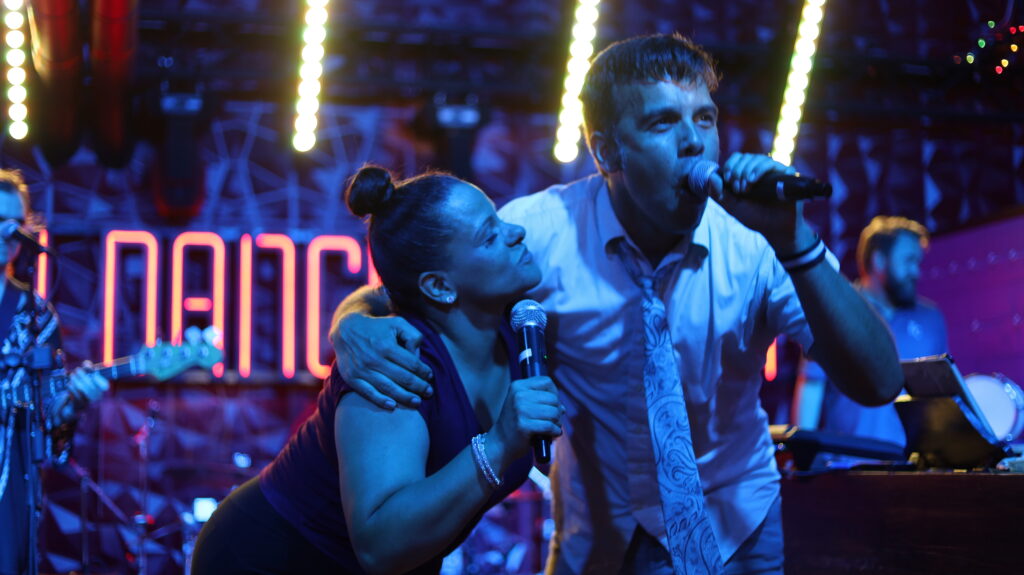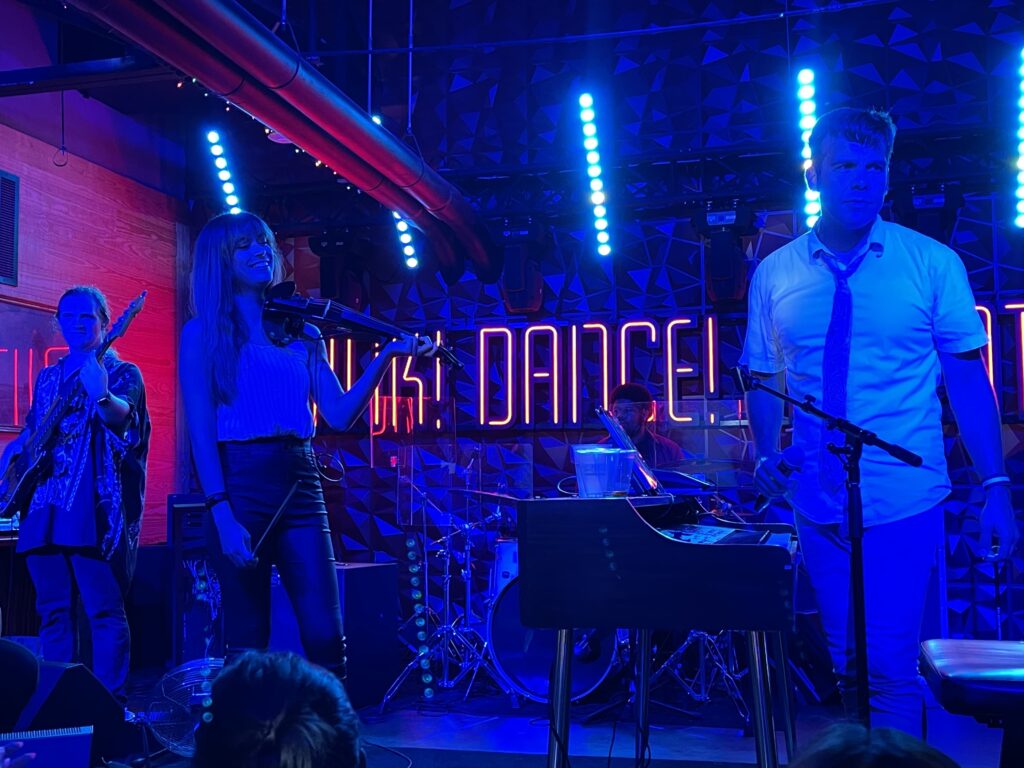Live Band, Six Lines from Daisy Jones and The Six
I love playing in a live band, and I love reading live bands
Just finished reading Daisy Jones and The Six, by Taylor Jenkins-Reid. A lovely story about love, heartache, and rock and roll, set in the backdrop of 1970’s Los Angeles, a hotbed of live-music creativity in the 20th century. Here are my six favorite lines from the book that line up with our experience as Songwheels the live-band.
1. Win The Battle Before Its Begun
Win the battle before it’s begun
BiLLY: I stood there in front of that crowd, stone sober, feeling their excitement, knowing “Honeycomb” was heading for the Top 10. And I knew I had those people in the palm of my hand. I knew they wanted to like us. They already liked us. I didn’t have to win them over. I stood on that stage and … we’d already won.
Okay, still with me here, but this sounds like one of my favorite passages from The Art of War.
In these lie the expert’s victory in arms. Such strategies are not to be divulged beforehand, nor can they be taught before the battle. Now, the one who has the most tallies in the “temple calculations” before battle will surely be victorious over the one with fewer, let alone the one who has no tallies at all! From this I conclude that victory and defeat can be foreseen.
Using the temple calculations above, victory and defeat can be foreseen. The battle has already been determined. The win/loss outcome is already set. But there’s a crucial piece missing here, something we must address. In battle, there is a winner and loser. Similarly in sporting events, one team defeats the other team, the we count scoreTh at the end of the game, we all go home knowing who won and who lost. We don’t have this in the arts. What constitutes a win?
As performers in a live band, we believe that a great show is a win-win situation. We have a great time on stage, and the audience has a great time with us. Billy’s “temple calculations” were complete; his band was strategically positioned to win. What a great feeling…
2. Risk and Confidence Onstage
BILLY: Daisy didn’t actually have confidence. She was always good. Confidence is okay being bad, not okay being good.
We take a ton of risks in a Songwheels live band show. The audience will challenge us to perform unusual material, sometimes completely un-rehearsed. When that happens, the band instinctively trusts each other. We look around the stage for confidence, knowing that even if this is bad, we’ll have a great time and look forward to the next tune. There’s no moment so bad that we can’t fix it! Having that trust in each other allows us to risk the show for a great moment.

3. Managing Conflict in live band
On Conflict
WARREN: Some people just don’t threaten each other. And other people threaten everything about each other. Just the way it is.
Onstage chemistry is undeniable. I’ve been in live bands that didn’t gel musically, but we were great at partying as soon as the show was over. I’ve also been in bands that were made up of musical geniuses, and we all hated each other. Finding the right crew of people that balance respect, musicianship, professionalism…it’s not easy. When you’ve got it, hold on to it! We’ve finally found that in our collective of Kansas City musicians, and we love it!
4. Self-Acceptance
On self-acceptance
DAISY: Knowing you’re good can only take you so far. At some point, you need someone else to see it, too. Appreciation from people you admire changes how you see yourself…Everybody wants somebody to hold up the right mirror.
Daisy is a character in perpetual struggle of accepting herself. This line is an example of a broken clock being right, twice a day. I can identify times in my life when I agree with what Daisy is saying here, but I’ve also had times of supreme confidence and personal acceptance. Times when I didn’t need any outside validation. But I find myself asking what is the difference between validation and accountability. Completely disregarding the opinions of others, 100% of the time, certainly sounds like an exciting way to live. But it’s also alienating to those around you. In this passage, Daisy admits, with difficulty, that she desires some validation of certain people. Is this a flaw? Maybe, but it’s certainly human.

5. Difficult Artists
TEDDY: Someone who insists on the perfect conditions to make art isn’t an artist. They’re an asshole.
I embrace professional challenges. While some of them can be annoying, like playing three hours on a keyboard with a broken middle-C, I try to reframe them as opportunities. Having a challenge when I perform keeps me engaged, keeps me alive, and I believe that translates to the audience. Some musicians want to do it the same way, every time, with minimal effort. They believe this puts them in the zone, but it really just frees up their brain to space out and think about other things instead of the show. I’m guilty of that too, and a few audience members have been brave enough to point out when I’m coasting. That’s a signal to me that I’m too comfortable, and I’m not growing.
6. Artistic Expectations in a Live Band
On artistic expectations
DAISY: …I told him I felt like I’d made something that wasn’t exactly what I’d envisioned, but it was maybe good in it’s own right. I said it felt like me but it didn’t sound like me and I had no idea whether it was brilliant or awful or somewhere in between. And Teddy laughed and said I sounded like an artist. I liked that.
2023 is a funny time to create music. With a single computer, or a phone, a trained user can produce a professional-grade, world-class hit-song. As professional musicians in a live band, we know we have these tools, and some of us enjoy being deep in a well of our own creation, writing and performing all of the parts. Sometimes it’s as simple as “drag-and-drop” your drummer into track, other times you can draw a keyboard part without ever touching an instrument. I like that Daisy is discovering how to let go of her personal vision, and accept that her ideas come forth, they pass through the filter of her limits, and through the filter of her collaborators. What comes out on the other side is simply what’s meant to be.
7. Pacing A Live Show
Okay, my 7 favorite lines! lol
On pacing
BILLY: People like it when you make them sad, I think. But people hat it when you leave them sad. Great albums have to be roller coaster that end on top. You gotta leave people with a little bit of hope.
The true pros in a Songwheels live band are constantly aware of pacing. We’re feeling out the audience, keeping an eye on their energy. We always want to be one step ahead, one notch higher. If our energy is lower, we’re failing them. But to Billy’s point, we can still do a sad song with energy, passion, and enthusiasm, and bring the audience with us on a moment. After a moment like that, it’s up to us where we drive the bus next. Most of the time, it’s time to ramp up the energy again, and the roller coaster ride continues.



